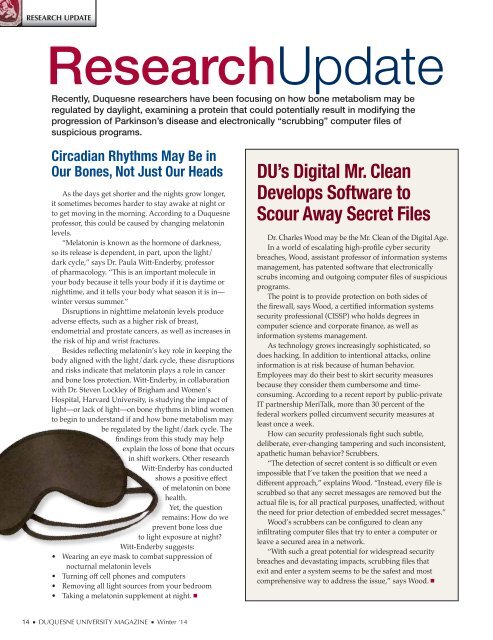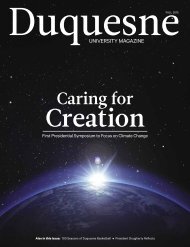2014-Winter-DU-Magazine
2014-Winter-DU-Magazine
2014-Winter-DU-Magazine
You also want an ePaper? Increase the reach of your titles
YUMPU automatically turns print PDFs into web optimized ePapers that Google loves.
RESEARCH UPDATE<br />
ResearchUpdate<br />
Recently, Duquesne researchers have been focusing on how bone metabolism may be<br />
regulated by daylight, examining a protein that could potentially result in modifying the<br />
progression of Parkinson’s disease and electronically “scrubbing” computer files of<br />
suspicious programs.<br />
Circadian Rhythms May Be in<br />
Our Bones, Not Just Our Heads<br />
As the days get shorter and the nights grow longer,<br />
it sometimes becomes harder to stay awake at night or<br />
to get moving in the morning. According to a Duquesne<br />
professor, this could be caused by changing melatonin<br />
levels.<br />
“Melatonin is known as the hormone of darkness,<br />
so its release is dependent, in part, upon the light/<br />
dark cycle,” says Dr. Paula Witt-Enderby, professor<br />
of pharmacology. “This is an important molecule in<br />
your body because it tells your body if it is daytime or<br />
nighttime, and it tells your body what season it is in—<br />
winter versus summer.”<br />
Disruptions in nighttime melatonin levels produce<br />
adverse effects, such as a higher risk of breast,<br />
endometrial and prostate cancers, as well as increases in<br />
the risk of hip and wrist fractures.<br />
Besides reflecting melatonin’s key role in keeping the<br />
body aligned with the light/dark cycle, these disruptions<br />
and risks indicate that melatonin plays a role in cancer<br />
and bone loss protection. Witt-Enderby, in collaboration<br />
with Dr. Steven Lockley of Brigham and Women’s<br />
Hospital, Harvard University, is studying the impact of<br />
light—or lack of light—on bone rhythms in blind women<br />
to begin to understand if and how bone metabolism may<br />
be regulated by the light/dark cycle. The<br />
findings from this study may help<br />
explain the loss of bone that occurs<br />
in shift workers. Other research<br />
Witt-Enderby has conducted<br />
shows a positive effect<br />
of melatonin on bone<br />
health.<br />
Yet, the question<br />
remains: How do we<br />
prevent bone loss due<br />
to light exposure at night?<br />
Witt-Enderby suggests:<br />
• Wearing an eye mask to combat suppression of<br />
nocturnal melatonin levels<br />
• Turning off cell phones and computers<br />
• Removing all light sources from your bedroom<br />
• Taking a melatonin supplement at night.<br />
<strong>DU</strong>’s Digital Mr. Clean<br />
Develops Software to<br />
Scour Away Secret Files<br />
Dr. Charles Wood may be the Mr. Clean of the Digital Age.<br />
In a world of escalating high-profile cyber security<br />
breaches, Wood, assistant professor of information systems<br />
management, has patented software that electronically<br />
scrubs incoming and outgoing computer files of suspicious<br />
programs.<br />
The point is to provide protection on both sides of<br />
the firewall, says Wood, a certified information systems<br />
security professional (CISSP) who holds degrees in<br />
computer science and corporate finance, as well as<br />
information systems management.<br />
As technology grows increasingly sophisticated, so<br />
does hacking. In addition to intentional attacks, online<br />
information is at risk because of human behavior.<br />
Employees may do their best to skirt security measures<br />
because they consider them cumbersome and timeconsuming.<br />
According to a recent report by public-private<br />
IT partnership MeriTalk, more than 30 percent of the<br />
federal workers polled circumvent security measures at<br />
least once a week.<br />
How can security professionals fight such subtle,<br />
deliberate, ever-changing tampering and such inconsistent,<br />
apathetic human behavior? Scrubbers.<br />
“The detection of secret content is so difficult or even<br />
impossible that I’ve taken the position that we need a<br />
different approach,” explains Wood. “Instead, every file is<br />
scrubbed so that any secret messages are removed but the<br />
actual file is, for all practical purposes, unaffected, without<br />
the need for prior detection of embedded secret messages.”<br />
Wood’s scrubbers can be configured to clean any<br />
infiltrating computer files that try to enter a computer or<br />
leave a secured area in a network.<br />
“With such a great potential for widespread security<br />
breaches and devastating impacts, scrubbing files that<br />
exit and enter a system seems to be the safest and most<br />
comprehensive way to address the issue,” says Wood.<br />
14 <strong>DU</strong>QUESNE UNIVERSITY MAGAZINE <strong>Winter</strong> ‘14




